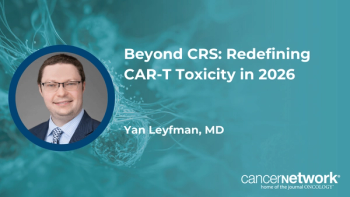
Relative Burden of Cancer-Related Death Exceeds Non-Cancer Deaths in Older Adults Selected for Surgery
At a population level, those who were selected for surgery had a greater risk of dying from cancer related causes than dying from non-cancer causes.
The relative burden of cancer-related mortality at the population level exceeded non-cancer related deaths in older adults selected for surgery, according to a study published in JAMA Surgery.
At a median follow-up of 46 months, among adults who underwent surgery, 49.6% of deaths (n = 16,900/34,044) were cancer related. Moreover, when reporting the cumulative estimated 5-year incidence of cancer death, investigators noted that the incidence of cancer-related death (20.7%; 95% CI, 16.2%-16.8%) was greater compared with noncancer mortality (16.5%; 95% CI, 16.2%-16.8%). At 1-year the estimated cumulative incidence of cancer death following surgery was 8.2% (95% CI, 8.4%-8.6%), at 3 years it was 16.4% (95% CI, 16.2%-16.7%), and at 5 years it was 20.7% (95% CI, 20.4%-21.0%).
“This is the first study, to our knowledge, to describe the population-level overall prognosis of older adults after cancer surgery including an analysis of cancer and noncancer deaths,” the investigators wrote. “The relative burden of cancer compared with noncancer deaths varied by cancer type, age group, and preoperative frailty status. Noncancer deaths became greater than cancer deaths only in patients who underwent a surgical procedure for breast cancer or melanoma, who were 85 years and older, and with preoperative frailty.”
The study identified 82,037 older adults who were going to undergo surgical resection for cancer. The most common types of cancer were breast cancer (27.8%; n = 22,811) and gastrointestinal cancer (39.1%; n = 32,036). Patients with postoperative mortality within 90 days of surgery were responsible for 11.2% (n = 3831) of deaths.
Additional findings from the study indicated that the estimated cumulative incidence of non-cancer death after surgery at 1-year was 5.3% (95% CI, 5.1%-5.5%), at 3-years it was 11.9% (95% CI, 11.6%-12.2%), and at 5-years it was 18.1% (95% CI, 17.8%-18.5%).
For all cancer types, the cumulative incidence of all cause death varied at 5-years from 22.0% (95% CI, 21.4%-22.6%) to 50.8% (95% CI, 47.2%-54.4%). The lowest 5-year cumulative incidence of death occurred in patients with breast cancer at 9.1% (95 % CI, 8.6%-9.5%) and the highest was oropharyngeal cancer at 29.1% (95% CI, 25.9%-32.3%).
Across most cancer types, the incidence of death was higher in cancer-related causes vs non-cancer death. However, the 2 exceptions were breast cancer and melanoma, which over the 5-year noncancer deaths were higher than cancer deaths. Although the cumulative incidence of non-cancer death was similar across gastrointestinal cancers, cancer-related death was varied, with the highest cumulative incidence being noted in hepato-pancreatico-biliary cancer and esophageal cancer. Those with bladder cancer had the greatest incidence of cancer death among all genitourinary malignancies.
Patients with advancing age were found to have a higher all-cause death at 5 years that ranged from 26.4% (95% CI, 25.8%-26.9%) to 57.0% (95% CI, 56.0%-58.1%). Investigators theorize that the increase in non-cancer death can be attributed to patients growing older. Patients who were 85 years or older had a greater incidence of death from cancer than from non-cancer deaths 5 years post-surgery surgery.
Investigators also identified an association between preoperative frailty and an increased risk of death and identified patterns in cause of death. For patients without frailty, the all-cause death at 5-years was 34.9% (95% CI, 34.9%-35.3%) vs 56.6% (95% CI, 55.2%-58.0%) in patients who were considered frail prior to surgery. Those with frailty pre-surgery had a greater incidence in death from non-cancer causes starting 3-years post-surgery.
Advancing age was associated with cumulative incidence of cancer death among patients aged 75 to 79 years (sub-distribution HR, 1.33; 95% CI, 1.28-1.38) to 85 years or older (sub-distribution HR, 2.06; 95% CI, 1.96-2.16) compared with those aged 70 to 74 years.
Patients with preoperative frailty were associated with increased cumulative incidence in death for both cancer and non-cancer death alike. The significance of the association between frailty and non-cancer death increased with age (P<.001), and no interaction was found for frailty/age and cancer deaths (P = .09).
All cancer types were strongly associated with an increased cumulative incidence of cancer, aside from breast cancer. The sub-distribution HR ranged from 2.34 (95% CI, 2.14-2.57) for melanoma to 4.69 (95% CI, 4.40-5.01) for bronchopulmonary cancer. This was not consistently observed for non-cancer deaths.
Investigators concluded that the data can be used to counsel patients and help assess patterns of over or under treatments, as well as refining selection criteria to treat older adults with cancer.
“Our study addresses these gaps in the literature by reporting on long-term survival outcomes for older adults undergoing cancer surgery stratified by cancer type, age, and preoperative frailty status and accounting for competing risks to avoid overestimation of the risk of cancer death in older adults. Previously, overall prognostic estimates for patients, clinicians, and health care systems planning were only available by applying data from younger patients,” they concluded.
Reference
Chesney TR, Coburn N, Mahar AL, et al. All-Cause and cancer-specific death of older adults following surgery for cancer. JAMA Surg. 2021;156(7):e211425. doi:10.1001/jamasurg.2021.1425
Newsletter
Stay up to date on recent advances in the multidisciplinary approach to cancer.













































